Richer or poorer? Ask the calculatorpublished at 18:23 GMT 8 March 2017
Use our Budget calculator to find out how your pocket may be affected by the latest tax measures.
Read MoreOBR downgrades UK growth forecasts
Sugar tax on soft drinks to be introduced
Fuel and beer duties frozen
New rail lines including Crossrail 2 and HS3 get green light
US Federal Reserve holds interest rates
Russell Hotten and Chris Johnston
Use our Budget calculator to find out how your pocket may be affected by the latest tax measures.
Read MoreThat's all from us on a very busy Budget Live Page. We'll be back tomorrow from 6am, when we expect a lot more Budget reaction and chancellor George Osborne's traditional next-day interviews on the BBC.
Goodnight.
The S&P 500 rose to its highest level in 2016 after the US Federal Reserve held interest rates steady and signaled fewer rate hikes this year.
The index gained 11.29 points, or 0.56%, to 2,027.22. The Dow Jones was also up - adding 74.23 points to 17,325.76 - and the Nasdaq rose 35.30 points to 4,763.97.
 Image source, PA
Image source, PAHow much is your average bottle of wine - £5, £15, £3.50? Whatever it is, you might need to recalibrate with wine going up by a whopping 4p on average. The Budget is raising duty on most wines (and sparkling cider) in line with inflation from Monday 21 March.
The increase comes despite duty on beer, whisky and cigars being frozen, points out the BBC's Paul Rowley.
Duty on cigarettes will rise more, going up by 2% above inflation. It means that from tonight a packet of 20 cigarettes rises by 20p, while a 30 gram packet of hand-rolling tobacco will cost 44p more, our correspondent calculates.
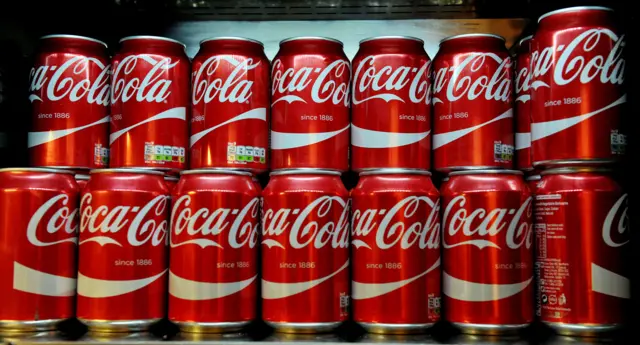 Image source, PA
Image source, PAQuote Message"We understand obesity is an issue that needs to be addressed and will continue our work to reduce the sugar and calories consumed from our drinks. We have already done a great deal and our actions are doing more to reduce sugar and calorie intake than a tax will. It's disappointing that the Government has chosen to single out soft drinks in its attempt to tackle the problem. If the aim is to reduce obesity, this levy flies in the face of evidence from around the world which shows taxes do very little, if anything, to reduce sugar and calorie intake or obesity levels but do add to people's cost of living."
Jon Woods, General manager, Coca-Cola Great Britain & Ireland
An increase in the limit for ISA savings to £20,000 pounds a year, and 600,000 small firms not having to pay business rates were some of the announcements in the Budget.
Read MoreLatest forecasts for growth are down and George Osborne says Britain faces a turbulent global economic environment
Read More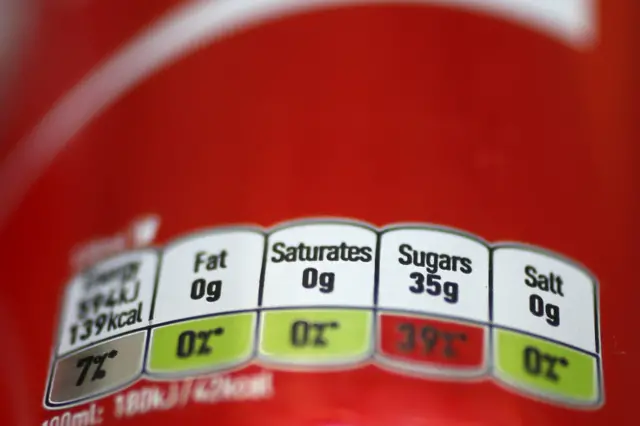 Image source, Reuters
Image source, ReutersKate Andrews, of the Institute of Economic Affairs, says experience in other countries has shown "a sugar tax is incredibly regressive".
She tells the BBC: "It's disproportionately going to affect the people at the bottom, people who are poor on low incomes."
In Mexico, where a "soda tax" was brought in two years ago, sugar consumption is down between 6% and 12%. Meanwhile, Finland's 7.3% tax rise on sugar led to only a 1% drop in sugar consumption in the first year, she said.
"People were still buying sugary drinks, but they were paying more for them. That is unfair for people at the bottom," she said.
US Federal Reserve chairwoman Janet Yellen is giving a press conference following the decision to hold interest rates.
She says: "Since the turn of the year, concerns about global economic prospects have led to increased financial market volatility and somewhat tighter financial conditions in the US, although financial conditions have improved notably more recently.
"In addition, economic growth abroad appears to be running at a somewhat softer pace than previously expected. These unanticipated developments, however, have not resulted in material changes to the Committee's baseline outlook."
Slower economic growth has meant Chancellor George Osborne has rethought how he will meet his target to spend less money than he brings in by 2020.
Read MoreDespite expectations, George Osborne's Budget was neither dull nor timid.
Read More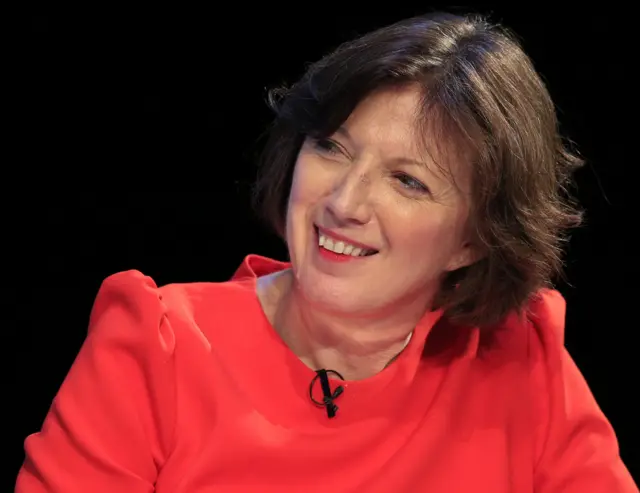 Image source, PA
Image source, PATUC General Secretary Frances O’Grady has given her thoughts on the Budget:
Quote MessageThe chancellor’s speech shows his gamble isn’t paying off. Far from increasing growth, he’s had to downgrade his forecasts and accept that his plan is failing on productivity and pay. Real earnings next year are set to grow even more slowly than he’d previously announced. And he’s had to admit that overall government debt is up too."
Frances O'Grady, TUC general secretary
Away from the UK Budget for a moment... The US central bank says the economy will continue to grow and the jobs market strengthen, but that "global economic and financial developments continue to pose risks" and will keep inflation low for the remainder of 2016.
Federal Reserve chairwoman Janet Yellen will expand on the health of the US economy at a press conference later.
Business correspondent Jonty Bloom reports:
The OBR says that the new sugar levy will raise £500 million a year over the last three years of the forecast. Because it will push up the rate of inflation, gilt rates will therefore cost the government a one-off £1bn in 2018/19 in higher accrued interest on index-linked bonds.
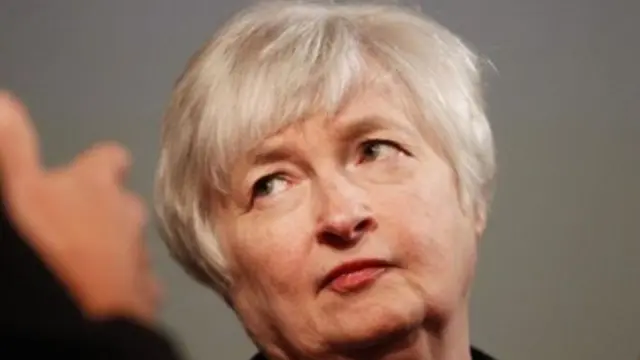 Image source, Reuters
Image source, ReutersThe Federal Reserve has held interest rates steady, but indicated that moderate US economic growth and "strong job gains" would allow it to resume tightening monetary policy this year.
The US central bank, however, noted that the US continues to face risks from an uncertain global economy even as fresh projections from policymakers showed they expected two quarter-point rate hikes by the year's end.
"A range of recent indicators, including strong job gains, points to additional strengthening of the labor market. Inflation picked up in recent months," the Fed said in a policy statement in which it kept the target range for its overnight lending rate at 0.25% to 0.50%.
Fed chairwoman Janet Yellen is due to hold a news conference later.
Technology correspondent Rory Cellan-Jones tweets:
Allow X content?
This article contains content provided by X. We ask for your permission before anything is loaded, as they may be using cookies and other technologies. You may want to read X’s cookie policy, external and privacy policy, external before accepting. To view this content choose ‘accept and continue’.
Vote Leave chief executive Matthew Elliott comments on today's Budget:
Quote MessageThere is one Budget the Chancellor didn't touch today - the £350 million of taxpayers' money he hands to Brussels every week. Nor could he cut taxes like VAT which we've given up control of to the EU Commission. Disappointingly, the Chancellor sought to politicise the OBR and drag it into his campaign to keep us in the EU despite the OBR making clear that it was not making a judgment about the referendum. If we want to take back control of our economy and our democracy so the Government can spend our money on our priorities, the only safe option is to vote Leave."
How are the nation's political commentators taking the budget, at this very early stage?
The Daily Telegraph's Janet Daley says there was one clear message in the budget from the Chancellor, external "I am the man to lead the country to a successful future by keeping us within the European Union and maintaining the Union with Scotland." But she doubts that "it will do much" for the Chancellor's leadership ambitions, or the case to stay in the EU.
In The Guardian, Gaby Hinsliff asks readers to forget the announcements on sugary drinks, or small business,, external and says the bit of the budget that mattered most was "the doom-laden stuff at the beginning about how the world economy may be about to go horribly wrong". She says the Chancellor is "unlikely to survive" a second recession in his job and he "sounded like a man outlining his legacy".
The Spectator's Isabel Hardman calls the budget "strikingly cautious", external, aside from the announcement of a levy on soft drinks manufacturers. George Osborne is "clearly not keen for any sort of fight with his backbenchers at all", she says.
And in The Mirror columnist Ros Wynne-Jones, external says that the Chancellor is forcing the disabled and the poor to pay for a "largesse" of tax cuts for the rich. She says they are "the people who always pay for Tory budgets".
Budget debate
 House of Commons
House of Commons
Parliament
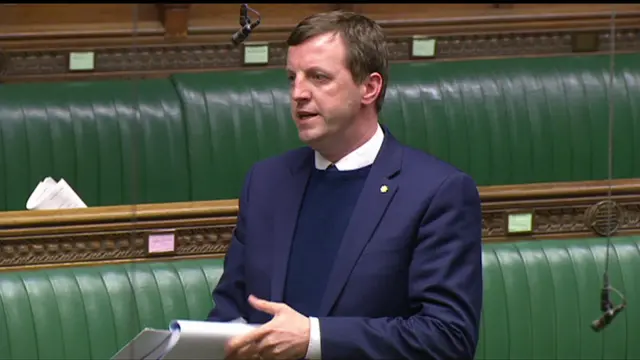 Image source, bbc
Image source, bbcPlaid Cymru's Jonathan Edwards says "the economic skies are darkening", and adds we are facing "another obvious bubble in house prices" and warns that productivity is too low. He calls for increases in infrastructure spending.
He argues that the government has failed to rebalance the economy, and accuses the Treasury of treating Wales "like a fiscal second class nation".
Green Party MP, Caroline Lucas tweets...